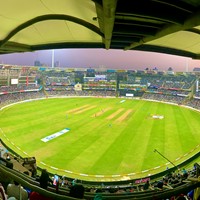What suspending the IPL means for advertisers
With India in the grip of a merciless second wave of the coronavirus pandemic, it was only a matter of time before the Indian Premier League – the world’s richest and most prestigious Twenty20 cricket tournament – faced calls for postponement or cancellation. With IPL 2021 not yet half-way through, the Board of Control for Cricket in India (BCCI) reluctantly took the decision to suspend the tournament at the start of May, following an increase in Covid cases among players, this despite teams staying in secure hotel bubbles and no fans in stadia.
IPL 2021 was one bright spot of live sporting entertainment in the gloom of the pandemic, attracting an average of 105m unique viewers in its first two weeks.
Naturally, with many other live events postponed or cancelled, this year’s IPL was a honeypot for national and global advertisers. But with the BCCI suspending all competition indefinitely, brands committed to advertising and other marketing spend around the IPL need to ask themselves – and their agencies – some serious questions, and fast. There are four areas in particular where I believe they should focus their energy, attention, and questions, to make sure that the suspended IPL doesn’t cost them dear.
Media already booked
Advertisers should start by investigating what happens to media already booked, around live broadcasts of games and highlights packages. Questions should include: “Are we able to cancel bookings made against our media plan for supporting the tournament?”, “What are our commitments now that the tournament has been suspended?”, and “Can we secure refunds?”
The simple and brutal truth – for this issue as for the others considered in this article – is ‘it depends.’ Crucially, it depends on the nature and status of advertiser-agency contracts, and specifically it depends on the Force Majeure clause in those contracts. Force Majeure clauses free both parties from liability when extraordinary events beyond their control take place, from wars to riots, strikes to pandemics. In the case of the suspended IPL, advertisers need to review their contracts to establish whether they contain a Force Majeure clause and whether or not it covers them for spots already booked. When reviewing and rewriting contracts to make them fit for purpose, advertisers would be well advised to work with an independent partner, expert in negotiations, to ensure they are written in a way that secures their best interests.
Rebates
For unconsumed media inventory – space for ads that have not, will not, and cannot run because there is no live or recorded coverage of IPL 2021 alongside which they could appear – advertisers need to establish whether their contract allows for planned budgets to be refunded to them directly. In some cases, contracts stipulate that the cash that would have funded ads that are cancelled because events are cancelled is held by the agency, or the agency is entitled to use it to purchase other available media inventory. This is especially true of media inventory that the agency may have bought in bulk from broadcasters, publishers, and platforms. Again, it’s vital that brands review and update their contracts regularly if they’re going to avoid situations like this.
Impact on agency revenue
With the biggest event in the sporting calendar suspended – and only very tentative plans for resumption, some time in Q4 2021 – there will be a significant knock-on effect on agency revenue. With no new media bookings on the horizon, agencies and agency holding companies may look to compel advertisers to pay for unconsumed media inventory if they are entitled to do so under the terms of the contract.
Beyond the impact of the suspended IPL in the short term, as brands look to reset their agency relationships with revised contracts, they should include terms that allow for an independent, third-party review of media plans. This is particularly true as regards the use of inventory media – media bought in bulk by agencies and sold on to advertisers with conditions attached, often including brands waiving their right to audit. Too large a percentage of total media spend allocated to inventory media might be against brands interests.
Minimising losses
Part of the process of review should consider whether contracts currently in place are strong enough to help advertisers minimise losses. It’s important to ensure that contracts are both fit-for-purpose and sufficiently flexible. In addition to the contract, the Statement of Work (SOW) plays a critical role here. When major deals – such as those around the IPL – are finalised, the SOW should include clear directions covering advertiser consent about reallocation of funds. In the case of the IPL, the SOW should have covered options in case of cancellation, suspension, or postponement. It should have made clear whether the deals, rates, and placements negotiated before the start of the tournament still hold good for the second half of this fractured season in the event of a restart. If not, it should have detailed what extent of variance would be acceptable.
Summing up
For advertisers to protect their interests in the peri-pandemic world, as well as in the medium- and long-term future, good practice demands regularly reviewing and updating contracts with agency partners. That’s table stakes. It is our repeated experience, however, working with national brands and the local offices of global brands, that still too many advertisers operating in India do not have the right contracts in place to service their increasingly sophisticated media needs.
Covid has accelerated many underlying trends in marketing, and I am optimistic that many advertisers will seize the opportunities presented by current trading conditions to course-correct and set themselves up for even greater success in the years ahead. To mitigate risk and maximise ROI, that all starts with reviewing and resetting contracts with media and other marketing agencies.
Accountability and good governance in marketing is a two-way street. As well as negotiating and agreeing contracts that are in their own best interests, advertisers also need to ensure that they remunerate their agency partners fairly, in timely fashion, and for the work done. This is the best way to expedite the processes of reconciling billing, allocating the correct budget, and avoiding unnecessary leakage. It is the foundation of building more durable agency partnerships, partnerships that are robust enough to ride out situations as abnormal and unexpected as the current pandemic.
This article was featured in Campaign India.








